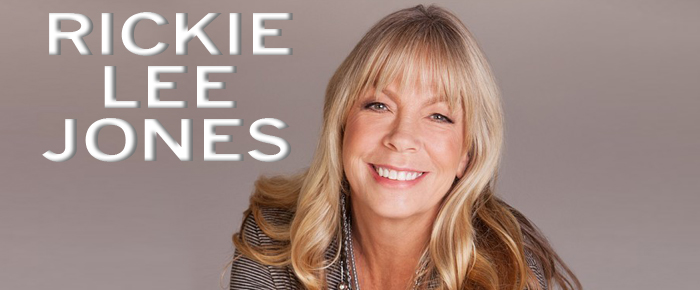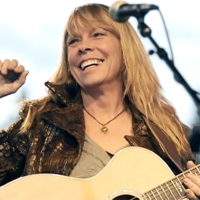
By Eleni P. Austin
When Rickie Lee Jones sings, she demands your complete attention. Don’t think you are going to put one of her records on and clean house, it’s impossible. Forget about reading the paper, or a book, you won’t be able to concentrate on anything but her.
Rickie Lee pulls you in and holds you close. Her melodies are impeccable, her sense of harmony is sui generis. She’s a storyteller, a raconteur. She spins yarns and shares confidences. She’s the life of the party, she’s the solitary wayfarer, she is one of a kind.
It seemed as though Rickie Lee Jones burst on the music scene with the arrival of her self-titled debut in 1979. But for her, she had been working toward that moment her whole life.
Rickie Lee was born in Chicago in 1954, to Bettye and Richard Jones. Both her paternal grandparents, Myrtle Lee Jones and Frank “Peg Leg” Jones had careers in vaudeville. Richard nursed musical ambitions but worked odd jobs to support the family.
It was Richard who gave Rickie Lee her love of music. The first song he taught her was “Bye Bye Blackbird.” She endured a peripatetic childhood, relocating to Arizona and then Olympia, Washington. It was in Washington that Richard abandoned his family. Stung by his desertion, she quit school and began hitchhiking. She made her way to Huntington Beach and then Venice, determined to have a career in music.
Inspired in equal measure by the Beats, the Beatles, Jazz and the lavish style of Rodgers and Hammerstein, Rickie Lee began writing her own songs, waitressing to make ends meet. She played Open Mics, coffee houses and the legendary Hoot Night at the Troubadour. Her running buddies were boyfriend Tom Waits and Chuck E. Weiss; perfect partners in crime for her boho adventures.
A friend infamously sang a ragged version of Rickie Lee’s “Easy Money” composition over the phone to Lowell George, front man for Little Feat. His version appeared on his solo debut, Thanks, I’ll Eat It Here.
Warner Brothers Records took notice and signed Rickie Lee in late 1978. Her astonishing debut arrived in the Spring of 1979. It was a revelation. The first single, “Chuck E.’s In Love” was a Jazzy slice of finger-poppin’ cool. Catchy tracks like “Danny’s All-Star Joint” and “Youngblood” were leavened by more confessional and contemplative cuts like “Last Chance Texaco,” “Coolsville” and “Company”
The cover photo of Jones in a red beret dragging on a cheroot, cemented her image as the Duchess of Coolsville. The album shot up the charts, peaking at #3. Rickie Lee was nominated for four Grammys and won one for Best New Artist.
New found fame engendered some fall-out. Rickie Lee and Tom Waits broke up. She relocated to New York, channeling her heartbreak into drug addiction and creating her second album. Pirates was released in late 1981. The melodies were grandly cinematic, the lyrics offered sharp tableaus involving street characters like Louie, Eddie and Zero. Again, critical praise was lavish.
Constant touring took a toll and Rickie Lee was pretty spent when it became time to record a third album. As a stop-gap measure, her label released Girl At Her Volcano, a 10” EP that included her radical re-imaginings of Pop classics like “Walk Away Renee” and “Under The Boardwalk” as well as Jazz standards like “Lush Life” and “Something Cool.”
Rickie Lee returned in 1984 with The Magazine. Partly recorded in France where she had gone to kick some debilitating addictions, the album is ambitious, but uneven. During this time she met and married French musician, Pascal Nabet-Meyer. The couple welcomed a daughter, Charlotte Rose a couple of years later.
After a few years that concentrated on maternity and domesticity, Rickie Lee returned, guns blazing, with her fourth album, Flying Cowboys. Released in 1989, and produced by Walter Becker (half of Steely Dan), the album was a triumph. A graceful mix of her streetwise song craft and the new found joy of motherhood. Critics were ecstatic, and the general public took note, propelling Rickie Lee back on the charts and in the limelight.
1991 saw the release of Pop, Pop. Surrendering to writer’s block, Rickie Lee recorded an album of covers ranging from Jazz standards, Broadway show tunes and Jefferson Airplane. It was a feat she would repeat on two more albums, It’s Like This in 2000 and The Devil You Know in 2012, re-configuring familiar songs by Marvin Gaye, Lerner & Lowe, the Beatles, Neil Young, Donovan and the Rolling Stones.
Rickie Lee released two albums of original material in the ‘90s, the hushed Traffic In Paradise and the experimental Ghostyhead 2003’s wonderful Evening Of My Best Day was surprisingly politicized. 2007’s Sermon On Exposition Boulevard was a song cycle inspired by Jesus’ own words. 2009’s Balm In Gilead was a return to form. The record included a wistful version of her father’s composition, “The Moon Is Made Of Gold, as well as “Wild Girl,” a loving tribute to her 21 year old daughter, Charlotte Rose.
Two years ago, Rickie Lee was ready to leave Los Angeles, she contemplated moving to Florida, but opted instead for the more familiar New Orleans, (she had spent time there with her father and his second wife in the early 80’s).
Inspired by the Crescent City’s feeling of community and vibrant musical scene, her chronic writer’s block began to recede. The result is her 12th studio album, The Other Side Of Desire.
The opening track, “Jimmy Choos” feels warm and inviting. Lilting acoustic guitar notes weave through a tapestry of Hammond B3, piano and Wurlitzer. Rickie Lee counsels a friend headed down the wrong path, offering advice and empathy without passing judgement. “I know about the Motel 6, I know about the truck stop station/I know all about giving up on yourself, you don’t have to tell me about giving up.”
Three songs, “Volz De Mon Pere (Lover’s Oath),” “Christmas In New Orleans” and “Jai Connais Pas,” illustrate Rickie Lee’s affection for her new hometown. Each one feels steeped in Big Easy tradition.
“Volz…” is a cracked Cajun waltz powered by luminous fiddle, banjo, mandolin and upright bass. The title, loosely translated, means “waltz for my father,” the lyrics offer this bittersweet encomium aimed at her beloved dad. “Even though we’re parted from the physical world, I’ll always be your girl/And I’ll watch the world for signs of love.”
“Christmas In New Orleans” is equal parts noble fragility and solid stoicism. Trumpet, trombone and saxophone partner with liquid slide guitar riffs to form a loose-limbed Second Line. Here Rickie Lee seems to be simultaneously mourning and celebrating a lost love. (Maybe with the initials T.W.?) “How could you explain a life as crazy as ours/How would I explain a love that fell from the stars, and burned a light into the dark/That was my life for a while…”
The ramshackle “J’ai Connais Pas” is a “Blueberry Hill” pastiche that summons the ghost of Fats Domino. Rickie Lee’s mien shifts from objurate to philosophical as she offers this hard-won wisdom; “happiness is what you choose, when there’s nothing left to lose.”
The most powerful tracks here allow Rickie Lee to stretch and explore new sonic landscapes. “Infinity” feels devastatingly intimate. The spacious, minor key melody is anchored by a clicking stop-watch rhythm and warm piano notes. Rickie Lee pulls us close, sharing what feels like a 12 step mis-step. “And now I go wrong, I always do go wrong, and someone has to help me now/ Marsha pulling off my shirt, it’s caught around my neck, it hurts and I can’t breathe/You’re killing me with kindness, why don’t you let me go.”
“Haunted” is a cautious celebration of love. Skeletal percussion is matched by rubbery bass lines and fluttery, insistent guitar. The arrangement shares some musical DNA with Elvis Costello’s recent collaboration with the Roots. The lyrics explore the dichotomies of love; “You’re so happy, you can forget you ever cried/But you better hold on to your tears…hold onto your heartache.”
Finally, “Feet On The Ground” obliquely honors her daughter, Charlotte Rose. The verse is somber and wary, cataloguing the worries a parent will always harbor, no matter how old their child is. But the chorus is a magnificent slice of sweet ‘70s Soul. The lush instrumentation and layered harmonies recall the sumptuous sounds of the Delfonics and the Stylistics, while the melody echoes the Philly Soul classic, “People Make The World Go ‘Round.”
It’s interesting to note that the music that influenced Rickie Lee in her youth continues to resonate for her today. On “Blinded By The Hunt,” she displays her versatility by playing all the instruments herself. The melody locks into a sly groove that recalls the Tamla/Motown sounds she absorbed in the late ‘60s.
“I Wasn’t There” turns the clocks back further. Propelled by a string section that swoops and glides over a gossamer waltz, it feels like a long lost Rodgers & Hammerstein song. The world-weary Rickie Lee is transformed into a shy but exuberant ingénue.
The album closes with “Finale (A Spider In The Circus Of The Falling Star).” The delicate melody is awash with sousaphone, trombone, guitar, tambourine, piano and banjo, giving it a rustic NOLA patina.
Production duties on The Other Side Of Desire were split between John Porter (Roxy Music, the Smiths, B.B. King and Buddy Guy) and Mark Howard (Emmylou Harris, Iggy Pop, R.E.M.)
The musicians are mostly local and homegrown, Doug Belote on drums, James Singleton and Matt Perrine on bass, Shane Therriot and John Fohl on guitar and David Torkanowsky on Keys. The Horn section is comprised of Eric Bloom on trumpet, Rex Gregory and Brad Walker covering saxophones, while Charlie Halloran played trombone. New Orleans legends like Zachary Richard and Jon Cleary lend a hand, and Rickie Lee’s old friend, Lenny Castro adds his trademark percussive touch.
Although Rickie Lee relied on producers, she was clearly in command. The arrangement on each song bears her imprimatur. Plus her vocal stylings remain non-pareil. It almost doesn’t matter what she’s saying, but how she’s saying it. The playful way she parses “Choo shoes, Choo shoes, Choo shoes” on “Jimmy Choos” The thrilling little “do,do,do,do,do” run on “Haunted,” the way she caresses and teases the word “delish-ous” on “I Wasn’t Here.” Her honeyed harmonies are exquisite.
The Other Side Of Desire sounds like it was a joy to create. It’s most definitely a joy to listen to. Rickie Lee Jones takes chances, pushes boundaries and carves her own path. It hasn’t been easy, but it’s always been authentic.













































